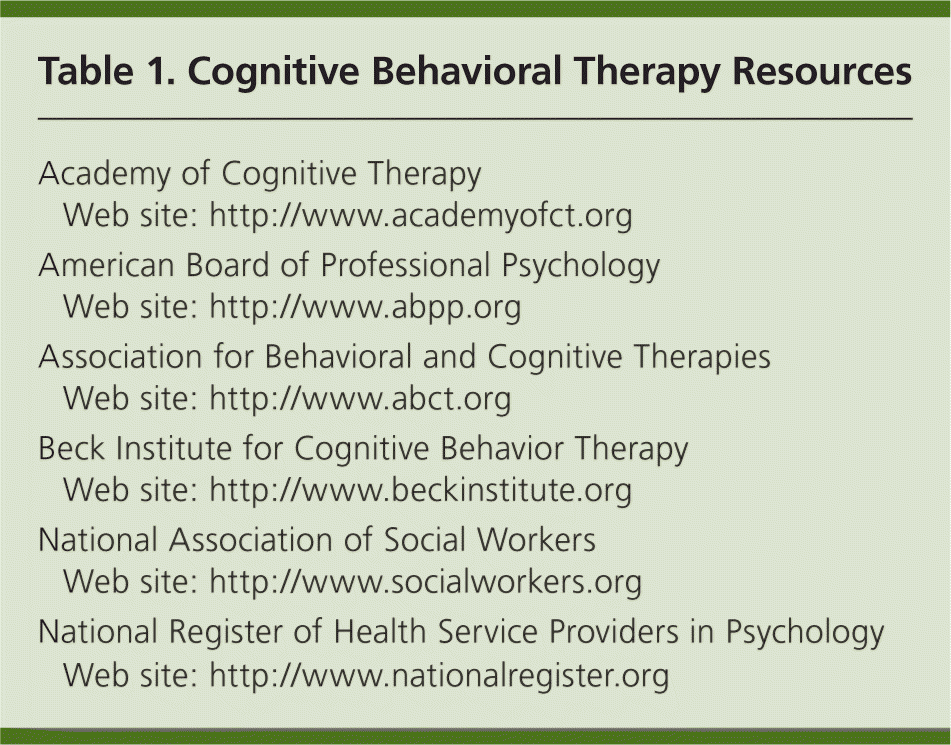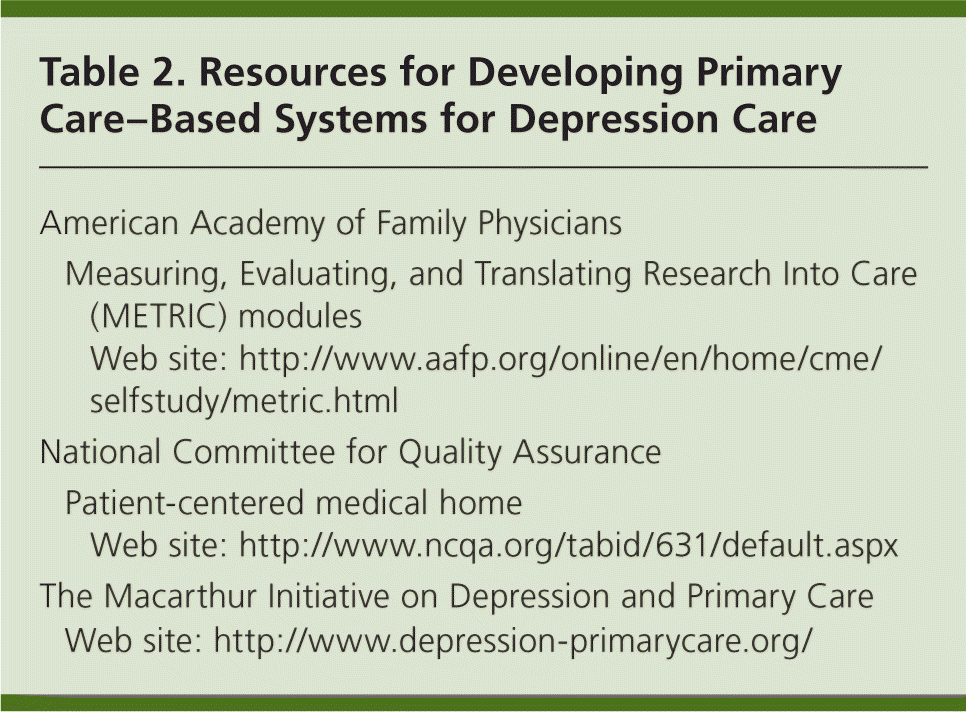
Am Fam Physician. 2012;85(7):686-687
Author disclosure: No relevant financial affiliations to disclose.
Cognitive behavioral therapy (CBT) is a well-established, scientifically proven treatment for patients with depression. For family physicians to take full advantage of this treatment, they must be able to understand the nature and application of CBT; access professional resources that support effective collaboration with patients and consultants; and incorporate CBT into organized systems of depression care, such as the patient-centered medical home.
CBT is based on the work of American psychiatrist Aaron Beck, who reasoned that some persons learn to perceive self, personal world, and the future in a biased fashion. Through a variety of cognitive errors, a person may develop dysfunctional beliefs that lead to ineffective behavior (coping), depressed mood, and unpleasant physical symptoms. Automatic thoughts that are derived from dysfunctional beliefs (cognitive schema) are thought to be the central element maintaining depressed mood.1–3
In contrast to other forms of psychotherapy, CBT is: (1) active (the therapist and patient engage in speaking, in listening, and in refining an understanding of the patient's problems); (2) directive (the therapist has a set of techniques, derived from CBT, to apply to the patient's underlying cognitive schema); (3) time sensitive (session length is fixed at 30 to 45 minutes; number of sessions is fixed at six to 12, with subsequent “booster” sessions available); (4) structured (the therapist works to keep the patient on task to complete in-session work and outside-session homework assignments); and (5) collaborative (the therapist and patient work together in setting mutually acceptable goals).3
CBT effectively treats depression (to remission) in a number of populations. Depression remission is typically defined as at least a 50 percent reduction in pretreatment depression scores. Based on this criterion, the literature supports recommending CBT in patients eight to 19 years of age (number needed to treat [NNT] = 3 or 4), 18 to 64 years of age (NNT = 3 or 4), and 65 years and older (NNT = 8 to 10) with mild to moderate depression.1,2,4–11 In addition, combining CBT and antidepressants may be better than either approach alone in adults with recurrent or severe depression (NNT = 3).1,2,6 CBT alone in adults with depression is associated with lower relapse rates than antidepressants alone (NNT = 6).1,2,6,12 CBT may also be effective in reducing self-harm in adults and adolescents.1,13
Individual and group CBT (with and without antidepressants) have been helpful in patients with mild to moderate postpartum depression.14–16 Adults with mild to moderate depression and a chronic medical condition also benefit from CBT (improvement in both depressive symptoms and the chronic medical condition).17
Family physicians can access several CBT resources (Table 1) that include educational handouts, podcasts, and therapist locator functions. For family physicians who are interested in providing CBT, the Beck Institute for Cognitive Behavior Therapy (http://www.beckinstitute.org) offers on-site and off-site training programs to teach CBT skills. A video of Judith Beck, PhD, discussing CBT can be viewed at http://www.youtube.com/watch?v=45U1F7cDH5k.

| Academy of Cognitive Therapy | |
| Web site: http://www.academyofct.org | |
| American Board of Professional Psychology | |
| Web site: http://www.abpp.org | |
| Association for Behavioral and Cognitive Therapies | |
| Web site: http://www.abct.org | |
| Beck Institute for Cognitive Behavior Therapy | |
| Web site: http://www.beckinstitute.org | |
| National Association of Social Workers | |
| Web site: http://www.socialworkers.org | |
| National Register of Health Service Providers in Psychology | |
| Web site: http://www.nationalregister.org | |
A consensus has emerged that depression is most effectively managed within an organized system of care.18–23 Accordingly, the U.S. Preventive Services Task Force recommends screening adults and adolescents for depression in practices with systems in place to assure accurate diagnosis, effective treatment, and follow-up.18,19 In this regard, multiple depression management strategies based on principles of chronic disease management have been evaluated.20–22
Collaborative care models for the management of depression in primary care improve diagnostic accuracy, treatment quality, adherence, and patient and physician satisfaction; reduce symptoms and hasten resolution; and improve functional status.20–22 Adults of all ages with depression have been shown to benefit from these models. Many collaborative care models include CBT as a treatment option. Essential personnel include a primary care physician, mental health specialist, and midlevel case manager.20–22 Effective collaborative care strategies include physician education, enhanced case management, integration among all health professionals, telephone or e-mail counseling by midlevel professionals, and a stepped-care approach. Stepped-care refers to determining patient response to depression treatment on a scheduled basis (more often early in treatment, less often during maintenance and follow-up) through routine readministration of a brief self-report questionnaire (e.g., nine-item Patient Health Questionnaire).24,25 For patients who remain depressed, treatment can be intensified as determined by the primary care team (e.g., adding CBT to antidepressants, adding antidepressants to CBT, increasing the dosage of antidepressants, adding or changing antidepressants).20–22
Professional resources are available to assist family physicians in treating patients with depression within an organized system of care. Table 2 provides links to practical tools relevant to the development of primary care–based systems for depression care.

| American Academy of Family Physicians | ||
| Measuring, Evaluating, and Translating Research Into Care (METRIC) modules | ||
| Web site: https://www.aafp.org/cme/cme-topic/all/metric.html | ||
| National Committee for Quality Assurance | ||
| Patient-centered medical home | ||
| Web site: http://www.ncqa.org/tabid/631/default.aspx | ||
| The Macarthur Initiative on Depression and Primary Care | ||
| Web site: http://www.depression-primarycare.org/ | ||
